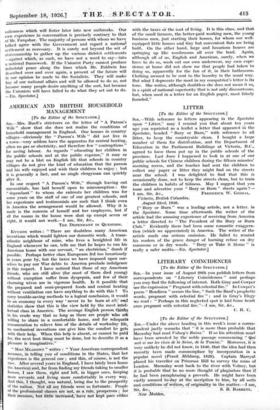AMERICAN AND BRITISH HOUSEHOLD MANAGEMENT
[To the Editor of the SPECTATOR.] Sin,—Mrs. Buell's strictures on the letter of " A Parson's Wife " show that she does not realize the conditions of household management in England. Our houses in country villages—obviously the " Parson's Wife " did not live in a town—very seldom have the apparatus for central heating, often no gas or electricity, and therefore few " contraptions " for saving labour. As regards " educating her children in the public schools and at the public expense," it may or may not be a blot on English life that schools in country villages do not give the kind of education that the parson and his wife enjoyed and wish their children to enjoy ; but it is generally a fact, and no single clergyman can quickly alter it.
In one respect " A Parson's Wife," through leaving out unessentials, has laid herself open to misconception : the dependant " to whom she entrusts her children was for some years on the staff of one of our greatest schools, and her experience and testimonials are such that I think even in America the arrangement would be allowed. Why it is made is the concern of herself and her employers, but if all the rooms in the house were shut up except seven or eight, it would not work.—I am, Sir, &c.,
THE DEPENDANT IN QUESTION.
KYNMON writes : " There are doubtless many American inventions which would lighten our domestic work. A trans- atlantic neighboUr of mine, who lives a benighted life in England whenever he can, tells me that he hopes to run his American home with one servant, " an electrician," dumb if possible. Perhaps better class Europeans fed too luxuriously in years gone by, but the taxes we have imposed upon our- selves to pay our War debts to America preclude indulgence in this respect. I have noticed that those of my American friends, who are still alive (for most of them died young) without exception suffer from dyspepsia, and few of their charming wives are in vigorous health. Is it possible that the prepared and semi-prepared foods and central heating without ventilation can have anything to do with this ? To carry trouble-saving methods to a logical conclusion, it 'would be an economy in every way ' never to be born at all,' and statistics show that this is the view held by the most intel- lectual class in America. The average English person. Oinks tin his crude way that so long as there are people 'who of willing to share in a comfortable home, and for adequate remuneration to relieve him of the details of workaday life, no mechanical inventions can give him the comfort he gets with their help. When this help is abient, or cannot be paid for, the next best thing must be done, but to deseribe it as a pleasure is imaginative."
" Miss MEADOWS " writes : " Your American correspondent assumes, in telling you of conditions in the States, that her experience is the general one ; and this, of course, is not the ease. After several years in England, I have lately been home (to America) and, far from finding my friends taking to smaller houses, I saw them, right and left, in bigger ones, keeping more servants. and living more comfortably in every way. And this, I thought, was natural, being due to the prosperity of the nation. Not all my friends were so fortunate. People of the professional classes are not, as a rule, prosperous ; for their incomes, but little increased,' have not kept pace either with the taxes or the cost of living. It is this class, and that of the small farmers, the better-paid working men, the young business men, just starting their homes, for whom our well- equipped little houses and tiny but convenient flats are being built. On the other hand, large and luxurious houses are springing up like mushrooms all over the land. Again, although all of us, English and American, surely, when we have to do so, wash out our own underwear, my own expe- rience at home did not show me that people had taken' to doing so, apparently for the fun of it, in their bathrooms. Clothing seemed to be sent to the laundry in the usual way. But what I deprecate the most in my compatriot's letter is its tone. She writes, although doubtless she does not mean it so, in a spirit of national superiority that is not only discourteous, but, when used in a letter for an English paper, most falsely founded."






























































 Previous page
Previous page